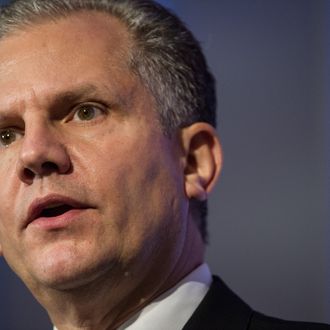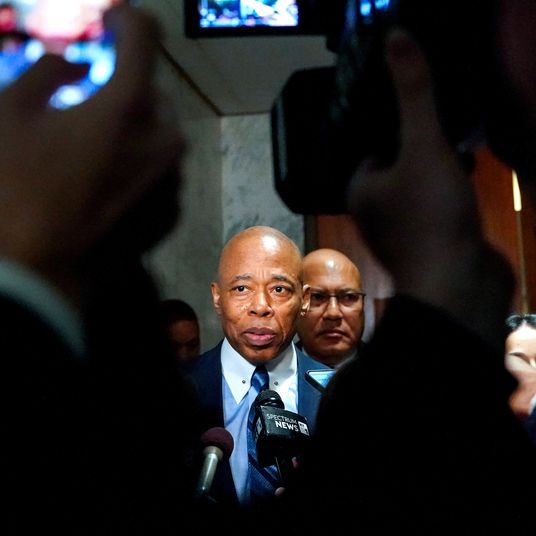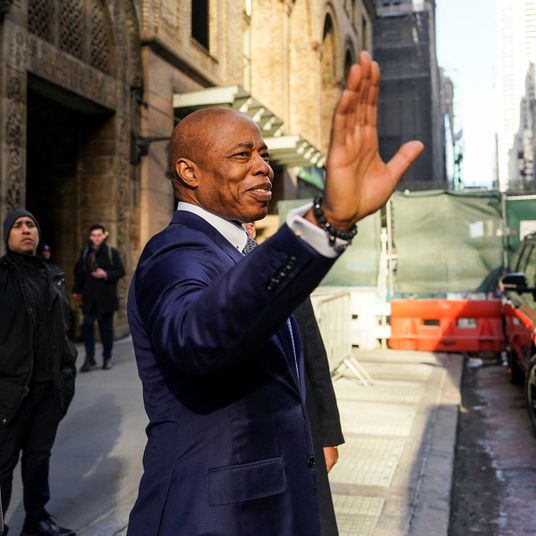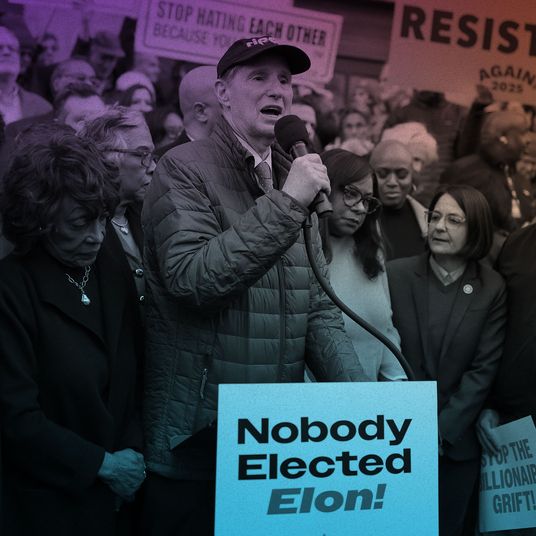
Since the evening after Jill Abramson was brusquely fired from her job as executive editor of the New York Times, representatives for the paper have repeatedly denied that her reported effort to be paid as much as her male predecessor, Bill Keller, was a factor in the decision to let her go. But — perhaps in part because of the Times’ shockingly clumsy handling of the situation — the pay disparity story isn’t going away. In a Saturday statement, publisher Arthur Sulzberger Jr. again attempted to convince the public that sexism was not to blame for Abramson’s termination.
In addition to writing that Abramson’s “pay package” was “comparable” to Keller’s (and “more than 10% higher than his” during her last full year at the Times), Sulzberger took more specific aim at what he saw as her deficiencies as a manager. “I heard repeatedly from her newsroom colleagues, women and men, about a series of issues, including arbitrary decision-making, a failure to consult and bring colleagues with her, inadequate communication and the public mistreatment of colleagues,” he wrote. “I discussed these issues with Jill herself several times and warned her that, unless they were addressed, she risked losing the trust of both masthead and newsroom.” According to Sulzberger, that’s exactly what happened.
Here’s the full memo:
Perhaps the saddest outcome of my decision to replace Jill Abramson as executive editor of The New York Times is that it has been cast by many as an example of the unequal treatment of women in the workplace. Rather than accepting that this was a situation involving a specific individual who, as we all do, has strengths and weaknesses, a shallow and factually incorrect storyline has emerged.
Fueling this have been persistent but incorrect reports that Jill’s compensation package was not comparable with her predecessor’s. This is untrue. Jill’s pay package was comparable with Bill Keller’s; in fact, by her last full year as executive editor, it was more than 10% higher than his.
Equal pay for women is an important issue in our country – one that The New York Times often covers. But it doesn’t help to advance the goal of pay equality to cite the case of a female executive whose compensation was not in fact unequal.
I decided that Jill could no longer remain as executive editor for reasons having nothing to do with pay or gender. As publisher, my paramount duty is to ensure the continued quality and success of The New York Times. Jill is an outstanding journalist and editor, but with great regret, I concluded that her management of the newsroom was simply not working out.
During her tenure, I heard repeatedly from her newsroom colleagues, women and men, about a series of issues, including arbitrary decision-making, a failure to consult and bring colleagues with her, inadequate communication and the public mistreatment of colleagues. I discussed these issues with Jill herself several times and warned her that, unless they were addressed, she risked losing the trust of both masthead and newsroom. She acknowledged that there were issues and agreed to try to overcome them. We all wanted her to succeed. It became clear, however, that the gap was too big to bridge and ultimately I concluded that she had lost the support of her masthead colleagues and could not win it back.
Since my announcement on Wednesday I have had many opportunities to talk to and hear reactions from my colleagues in the newsroom. While surprised by the timing, they understood the decision and the reasons I had to make it.
We are very proud of our record of gender equality at The New York Times. Many of our key leaders – both in the newsroom and on the business side – are women. So too are many of our rising stars. They do not look for special treatment, but expect to be treated with the same respect as their male colleagues. For that reason they want to be judged fairly and objectively on their performance. That is what happened in the case of Jill.
Equality is at the core of our beliefs at The Times. It will always be.
Meanwhile, in an article released a few hours after Sulzberger’s statement went out, Politico’s Dylan Byers reports that “sources who are sympathetic to the Times management” said that Abramson’s firing was ultimately due to her “misleading” effort to hire The Guardian’s Janine Gibson as Dean Baquet’s co-managing editor. As has been previously reported, Baquet (who is now Abramson’s replacement) complained to Sulzberger when he learned that Abramson had offered Gibson a job equal to his without consulting him. But Byers’s piece claims that Abramson implied to Sulzberger and Times CEO Mark Thompson that she had talked to Baquet and deputy managing editor Janet Elder about her decision to make Gibson co-managing editor, and that they had approved it. “The clear implication was that Dean and Janet had been told and endorsed the specifics of the plan for Janine. They had not,” said a “high-level” Times source.
According to Byers, Baquet only learned about the situation over lunch with Gibson, when she told him that she was “extremely tempted” to accept Abramson’s offer: “Baquet played along as Gibson discussed the offer, not wanting to betray his ignorance, and the lunch ended amicably, the sources said.” But when Baquet told a “shocked” Sulzberger what had happened, the publisher concluded that his executive editor had “misled” him. Given Sulzberger’s pre-existing problems Abramson’s leadership, the circumstances surrounding Gibson’s hiring was reportedly the straw that broke the camel’s back.
On Sunday, Ravi Somaiya, who has the unenviable job of covering Abramson’s firing in the Times itself, posted this series of tweets:
This post has been updated throughout.





























